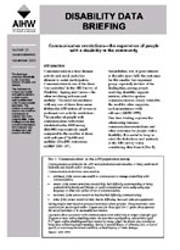Summary
Communication is a basic human activity and need, and a key element in social participation. Communication is one of the three
‘core activities’ in the ABS Survey of Disability, Ageing and Carers—the other two being self-care and mobility. The need for assistance with any one of these three areas defines the ABS notion of ‘severe or profound core activity restriction’.
The number of people with communication restrictions identified in the 1998 survey (166,900) was relatively small compared to the number of those with self-care (724,600) and mobility (516,400) restrictions (AIHW 2000: 107).
Nevertheless, it is of great interest to describe more fully the outcomes for this smaller but important group, especially in view of the finding that, among people receiving disability support services, effective spoken communication is closely related to the need for other supports, such as assistance with self-care (AIHW 1999).
This data briefing explores the relationship between communication restrictions and other outcomes for people with a disability. It is useful to keep in mind the definitions and methods of the ABS survey when considering data from it (Box 1).
Box 1: ‘Communication’ in the ABS population survey
Communication activities in the ABS survey included understanding or being understood by family and friends and/or strangers.
Communication restrictions were rated as:
- profound, if the person was unable to communicate or always needed help with communication;
- severe, if the person sometimes needed help, had difficulty understanding or being understood by family and friends, or could communicate more easily using sign language or other non-spoken forms of communication;
- moderate, if the person needed no help but had difficulty communicating;
- mild, if the person needed no help, had no difficulty, but used ‘aids and equipment’.
Survey results were based on personal interviews where possible. Proxy interviews were conducted for people aged under 15 years and for those aged 15–17 years whose parents did not permit them to be personally interviewed.
Questions about assistance with communication were asked only in respect of people aged 18 years or more with a disability where the interview was by proxy, and persons aged 5–17 years with a disability and interviewed by proxy, where the person was reported as being slow at learning/understanding, having a mental illness, or a hearing loss, or loss of speech, or a nervous/emotional condition, or head injury, or brain damage.
Source: ABS 1999
Sex difference
Communication and assistance received
Communication and schooling
Communication and employment
Communication and social participation
Communication restrictions as an indicator of need
End matter: References; Recently Disability related publications



